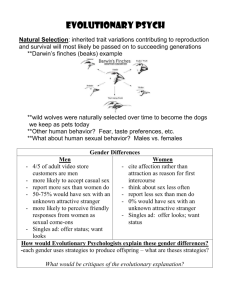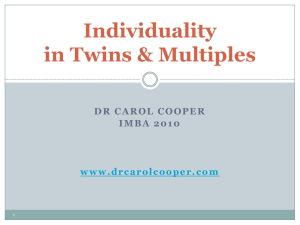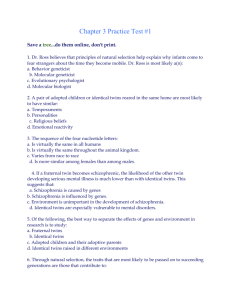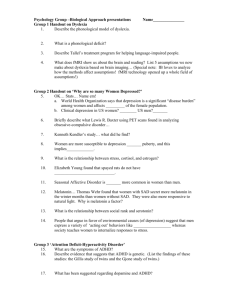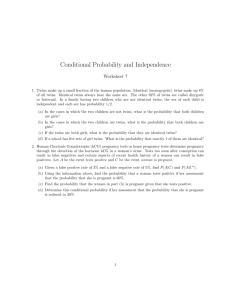Ben Dattner, Ph.d.
advertisement
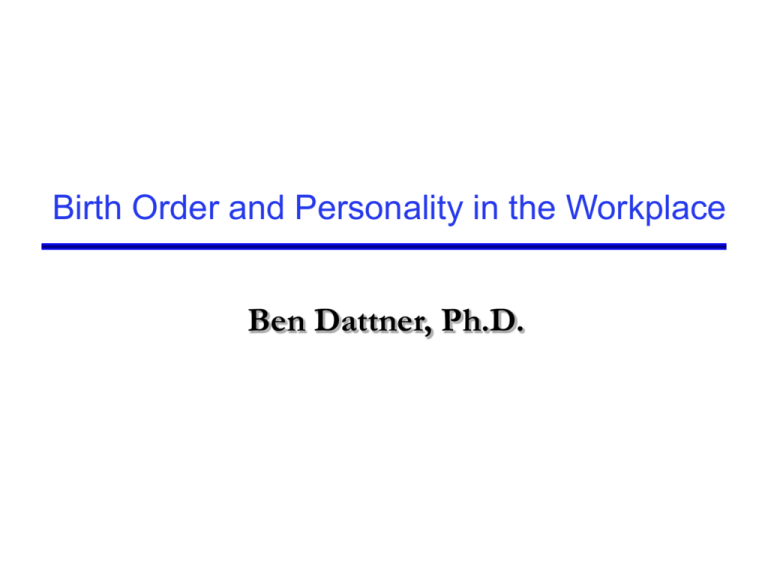
Birth Order and Personality in the Workplace Ben Dattner, Ph.D. Birth Order and Personality • Evolutionary Theory • First Born Children • Second Born Children • Middle Children • Only Children • Twins • Special Circumstances • Conclusion 2 Evolutionary theory Evolutionary Theory • First born children • Second born children • Middle children • Only children • Twins • Special circumstances Kinds of competition in evolution: • Conclusion • Between species • Within species, within genders • For status, power, resources, and mates • Within species, between genders • For less relative investment in offspring • Within species, between parents and their children • For resources • Within species, between siblings • For power and resources (Source: “Born to Rebel” by Frank Sulloway, 1996) 3 Evolutionary Theory Evolutionary theory • First born children • Second born children • Middle children • Only children • Twins • Special circumstances • Conclusion • Siblings compete for emotional, physical and intellectual resources from parents • Depending on sibling position, different niches are available, leading to different patterns of adaptation and different personalities • Childhood adaptation to a niche in the family is an important determinant of adult personality and therefore, is an important predictor of thought and behavior in the workplace 4 First Born Children • Definition First born children • Second born children • Middle children Birth order theory and research indicate that there is a greater probability that: • Only children • Twins • Special circumstances • Conclusion First born children will support the status quo as represented by their parents and relative to later born siblings, and tend to be more: • Extroverted and confident • Assertive, authoritarian, dominant, inflexible • Conformist, politically conservative • Task-oriented, conscientious and disciplined • Concerned about and fearful of losing position and rank • Defensive about errors and mistakes 5 Famous First Born • Definition First born children • Second born children • Middle children • Only children • Twins • Special circumstances • Conclusion Steve Ballmer, CEO of Microsoft: • Ballmer is the hard-driving operational manager who has implemented much of Bill Gates’ vision • Described variously as ebullient, focused, funny, passionate, sincere, and dynamic • Damaged his vocal chords by cheering too loudly at a Microsoft sales meeting • Steve’s sister, a social worker in the Seattle area, is two years younger 6 Famous First Born • Definition First born children • Second born children • Middle children • Only children • Twins • Special circumstances • Conclusion Andrea Jung, CEO of Avon: • "I was raised in a traditional, humble Asian environment. There was focus on achievement and education" • "Power is the privilege to influence," Jung says. "It's an unbelievable responsibility to influence decisions, shareholder value, and most important to me, people's careers and livelihoods” • Her brother, three years younger, runs a San Francisco software development company 7 Second Born Children • Evolutionary theory • First born children Second born children • Middle children • Only children • Twins • Special circumstances • Conclusion Second born children do not have the option of occupying the first born’s niche and relative to first born siblings, tend to be more: • Open to new experiences, rebellious, unconventional • Creative, flexible, more likely to embrace change and innovation • More empathic and relationship focused • Concerned about fairness and justice, champions of those with less power, more liberal politically • Less academically inclined, but better at using social intelligence and humor • More interested in travel and diverse cultures, often more successful at international assignments 8 Famous Second Born • Evolutionary theory • First born children > Second born children • Middle children • Only children • Twins • Special circumstances • Conclusion Louis V. Gerstner, Jr., Former CEO of IBM • Gerstner’s older brother was a high-level business manager at IBM when he joined the company • From the very beginning of his tenure at IBM, Gerstner made sure that everything he did communicated the need to change the way the organization did business • Gerstner transformed IBM, emphasizing a clear focus on customers and heavily investing in services and software 9 • Evolutionary theory Famous Second Born • First born children Second born children • Middle children • Only children • Twins • Special circumstances • Conclusion Ronald Lauder, CEO of RSL Investments • Lauder has successfully invested his family’s fortune in a wide variety of emerging businesses and markets • He was the US ambassador to Austria under Reagan and unsuccessfully ran for mayor of New York City in 1989, spending $400 for each vote he received • Ronald is the younger brother of Leonard Lauder, Chairman of The Estée Lauder Companies 10 Famous Second Born • Evolutionary theory • First born children Second born children • Middle children • Only children • Twins • Special circumstances • Conclusion George Soros, CEO of Soros Fund Management • Born in Budapest, Hungary, graduated from the London School of Economics, where his grades were not good enough to get into graduate school • Describes himself as a “failed philosopher” and has developed an investing philosophy he calls “reflexivity” • Gives away hundreds of millions of dollars each year through the Open Society Institute which encourages democracy • Considers his older brother Paul, an engineer, “the real brains in the family” 11 Middle Children • Evolutionary theory • First born children • Second born children Middle children • Only children • Twins • Special circumstances • Conclusion Middle children cannot employ the strategies used by either first born or youngest siblings and relative to other siblings, tend to be more: • Diplomatic and politically skilled • Good at negotiation, peacemaking, and compromise • Relatively closer to friends than to family Because of differentiation between adjacent siblings, non-adjacent siblings tend to be more similar to one another ( e.g.: 3rd is like 1st, 4th is like 2nd, etc.) 12 Famous Middle Born • Definition • First born children • Second born children > Middle children • Only children • Twins • Special circumstances • Conclusion Kenneth I. Chenault, CEO of American Express : • Balances an unrelenting achievement drive with friendliness and an open door policy • Classmates often chose Chenault to represent them in negotiations with school administrators because of his diplomatic skills • Ken is the second born of three brothers and one sister 13 • Definition Famous Middle Born • First born children • Second born children > Middle children • Only children • Twins • Special circumstances • Conclusion Michael Dell, CEO of Dell • Looks for employees who “expect change to be the norm” and who do not "accept the status quo as good enough” • Describes himself as “allergic to hierarchy” • He is the middle of three brothers, the youngest of whom is a successful venture capitalist 14 Famous Middle Born • Definition • First born children • Second born children > Middle children • Only children • Twins • Special circumstances • Conclusion Carleton "Carly" Fiorina, former CEO of Hewlett Packard • Fiorina leveraged her diplomatic skills to build coalitions and consensus, for example, in the highly contentious merger between HP and Compaq • Her leadership mantra: “It is not the strongest nor the smartest of the species who survive, but those who are most adaptable to change" • Has one older sister and one younger brother 15 Only Children • Evolutionary theory • First born children • Second born children • Middle children Only children • Twins • Special circumstances • Conclusion Only children are often similar to first born children, and tend to be: • Motivated to conform to parental expectations • Achievement oriented and good students • More inclined to do work themselves rather than to delegate Age gaps between siblings of more than 6 years lead each sibling to have only child attributes 16 • Definition Famous Only Child • First born children • Second born children • Middle children > Only children • Twins • Special circumstances • Conclusion Jack Welch, Former CEO of General Electric: • Welch was able to make the tough decisions necessary to build GE into a successful, “boundaryless” innovator • A highly disciplined worker, Welch has said “despite not being the smartest, I did have the focus to get the work done” • “Many of my basic management beliefs: competing hard to win, facing reality, setting stretch goals, and relentlessly following up, can be traced to my mother” 17 Twins • Evolutionary theory • First born children • Second born children • Middle children • Only children Twins • Special circumstances • Conclusion Because they are the same age (and, in the case of identical twins, share the exact same genes), twins tend to: • Have closer relations with one another than other siblings • Have less conflict with one another than other siblings • Be different in terms of personalities and interests, but more similar to one another than other siblings Twins raised apart are even more similar than twins raised together because they don’t need to differentiate from one another 18 Famous Twin • Evolutionary theory • First born children • Second born children • Middle children • Only children Twins • Special circumstances • Conclusion Jamie Dimon, CEO of JP Morgan Chase: • Dimon achieved enormous success as a protégé of Sandy Weill and was instrumental in helping Weill build Citigroup • Dimon is known as a brilliant strategic thinker, but had difficulty sharing power and credit with peers. He left Citigroup after coming into conflict with Weill’s daughter • Dimon and his twin brother have one older brother 19 Special Circumstances • Evolutionary theory • First born children • Second born children • Middle children • Only children Other variables, such as: • Gender • Twins Special circumstances • Conclusion • Culture • Socioeconomic factors • Family size • Attributes of parents • Divorce, additional marriages, and half- or step- siblings …may lead to deviations from the general patterns of birth order and personality characteristics in the workplace. Therefore, the impact of birth order on personality is not a fail-safe predictor and should not be used in human resource decisions. Also, since birth order involves family background and can be related to socioeconomic status, ethnic group membership, or religious affiliation, companies should be very cautious about inquiring about the sibling structures of job candidates if they decide to do so at all. 20 Special Circumstances (Continued) • Evolutionary theory • First born children • Second born children • Middle children • Only children • Twins Special circumstances • Conclusion As an example of an exception to the usual birth order pattern, second born children can take on first born attributes if: • There is a high degree of conflict between the first born and parents • Or if the first born is: • Disabled • Shy 21 Conclusion • Evolutionary theory • First born children • Second born children • Middle children • Only children • Twins • Special circumstances Conclusion Since birth order can have such a significant influence on personality, it can also help illuminate thinking and behavior in the workplace. However, because there are so many other variables that influence personality, and because birth order is part of one’s family background and can be related to religion and ethnicity, birth order should not be used as a criterion in selection or promotions. Birth order is more valuable for inspiring questions about personality and style than for providing answers. 22 Ben Dattner, Ph.D. NYU Psychology Department 6 Washington Place, Room 161G New York, NY 10003 1-212-501-8945 ben.dattner@nyu.edu www.psych.nyu.edu/dattner 23

